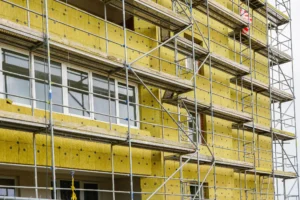In the wake of the Grenfell Tower tragedy, the UK’s construction industry entered a new era of accountability and reform. The government’s building safety programme has reshaped the façades and cladding sector — driving demand for qualified professionals, stringent compliance processes, and safer design standards. For employers and jobseekers alike, this regulatory shift is creating both challenges and opportunities. Here’s how safety and regulation are rewriting the rules — and the job market — for façades in 2025 and beyond.
1) From crisis to cultural change
The Grenfell fire in 2017 was a turning point for the UK construction sector. It exposed systemic issues in product testing, specification, and oversight — and catalysed one of the most sweeping regulatory transformations in modern building history.
The subsequent Building Safety Act 2022 and related secondary legislation have redefined how façades are designed, installed, and maintained. The focus has shifted from aesthetics and cost to safety, traceability, and performance.
The façade is no longer just a design feature — it’s a safety-critical system that must meet the highest technical and regulatory standards.
2) The regulatory framework: what’s changed
Key reforms now shaping the façade and recladding market include:
-
Building Safety Regulator (BSR): Oversees design, construction, and management of higher-risk buildings (HRBs), with statutory gateways at each project stage.
-
Golden Thread of Information: Requires digital, traceable records for all façade components, materials, and tests throughout the building’s lifecycle.
-
Fire Testing Standards: BS 8414 and BR 135 are now mandatory reference points for system-level fire performance testing.
-
Approved Document B Revisions: Tightened fire-spread restrictions on external walls and banned combustible materials on relevant buildings above 18m.
-
Mandatory Registration of High-Rise Buildings: Ensures consistent oversight and reporting.
These measures have introduced unprecedented transparency — and with it, a surge in demand for specialists who can interpret, implement, and evidence compliance.
3) The new world of recladding
The UK government’s Cladding Safety Scheme (CSS) and wider remediation programme are addressing unsafe cladding on thousands of residential and public buildings.
Billions of pounds have been allocated for assessment, design, and remediation, creating a significant long-term workload across:
-
Fire engineers and façade consultants
-
Building surveyors and compliance managers
-
Site managers and recladding project leads
-
Quality assurance inspectors and clerk-of-works professionals
-
Digital documentation and BIM specialists (supporting the Golden Thread)
Recladding is no longer a stopgap — it’s a dedicated sector in its own right, expected to remain active well into the 2030s.
4) How regulation is shaping hiring
Regulation has created new skill categories and career paths. Employers now need professionals who combine technical expertise with legislative fluency.
| Discipline | In-Demand Skills | Typical Employers |
|---|---|---|
| Fire Engineering | BS 8414 testing, cavity barrier design, fire strategy writing | Fire consultancies, façade engineers |
| Compliance & QA | Document control, Golden Thread records, Gateway submissions | Developers, Tier 1 contractors |
| Façade Engineering | Remediation design, materials selection, structural analysis | Engineering consultancies |
| Project Delivery | Sequencing, live building recladding, resident liaison | Principal contractors, recladding specialists |
| Surveying & Inspection | Defect identification, sample testing, condition reports | Building surveyors, government-funded programmes |
These roles are being filled not just by traditional façade specialists, but also by professionals from fire safety, construction management, and building surveying backgrounds — reflecting the industry’s convergence around compliance.
5) The human factor: culture and accountability
The new legislation doesn’t just redefine process — it redefines responsibility.
Under the Building Safety Act, specific dutyholder roles (Client, Principal Designer, Principal Contractor, Accountable Person) now carry legal accountability. This has triggered a culture shift across the industry:
-
Safety-first decision-making is now embedded in every project phase.
-
Documentation and evidence are valued as much as physical delivery.
-
Competence frameworks ensure that individuals performing safety-critical work are demonstrably qualified.
As a result, employers are seeking people with integrity, traceability, and compliance discipline — not just technical skill.
6) Candidate opportunities: where to focus
For professionals looking to build or advance a career in façades, recladding presents a wealth of opportunity — provided you can show relevant compliance literacy.
Skills and qualifications that add value include:
-
Fire safety credentials (IFE, Fire Door Inspection Scheme, Level 4 Fire Safety)
-
Building Regulations and Approved Document B knowledge
-
Experience managing Gateway submissions or digital “Golden Thread” data
-
IOSH / NEBOSH Construction certificates
-
Familiarity with façade testing protocols and materials certification
Many employers are also open to cross-sector entrants from construction quality management, surveying, and engineering backgrounds who are willing to upskill into façade-specific regulation.
7) Employer insight: building compliance-ready teams
For employers, the new façade landscape means more than ticking boxes. It requires:
-
Embedding compliance culture in project teams.
-
Investing in training and digital documentation systems.
-
Partnering with recruitment specialists who understand the new skill landscape.
-
Prioritising competence over convenience — hiring verified professionals with the right accreditations and traceable experience.
The companies that adapt fastest will be the ones that not only meet the new standards but also win the trust of regulators, residents, and clients.
8) Outlook: a safer, smarter, more skilled industry
The façade and recladding sector is in transformation — from reactive remediation to proactive excellence. Over the next five years, as remediation programmes mature and new buildings adopt higher standards, the emphasis will shift from fixing the past to designing for resilience and future-proofing.
That shift will keep demand high for engineers, safety professionals, and project leaders who understand that compliance isn’t bureaucracy — it’s the foundation of public trust.
🌱 Green Carbon Talent: Supporting Safer Building Futures
Green Carbon Talent works with clients and candidates at the forefront of façade and recladding projects across the UK. We understand the regulatory landscape, the skills required, and the responsibility that comes with working in this safety-critical field. Whether you’re hiring or applying, we connect the right people to the projects that are rebuilding confidence in Britain’s built environment.


